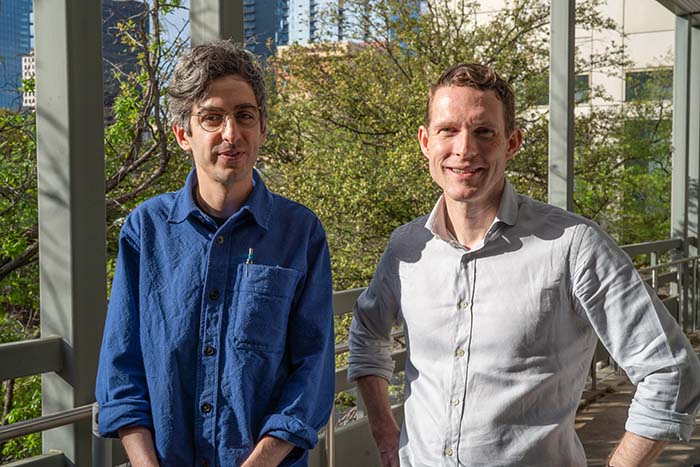
The New School at SXSW: The Psychedelic Renaissance: High Hopes and Rising Criticisms
Psychedelics made the trip to the South by Southwest (SXSW) conference for the first time this year, as therapeutic applications of these drugs gain prominence in the mainstream. The New School joined in on the conversation with the panel “The Psychedelic Renaissance: High Hopes and Rising Criticisms,” featuring Nicolas Langlitz, associate professor of anthropology and founder and director of the Psychedelics and Humanities Lab, and Hamilton Morris, BSc Liberal Arts. The two discussed whether psychedelics are the miracle drug many are hoping for and why history appears to repeat itself as we enter a new era of enthusiasm for psychedelics.
Views of psychedelics have fluctuated over the many decades in which they have and haven’t been researched. “We are in a very divided time in terms of public perception of psychedelics. On one hand, you have reports about psychedelics, microdosing, or MDMA curing various psychological disorders that often treat them as panaceas that will usher in a revolution in psychotherapy. This has been accompanied by an enormous amount of hand wringing about the business dimensions of the commercialization of psychedelics,” says Morris. “People are concerned about the widespread patenting of psychedelic medicines, they’re concerned about issues of Indigenous reciprocity, they’re concerned about sexual abuse, and you can see that the coverage is divided along these lines.”
Psychedelics in the United States have long been associated with the hippie culture of the 1960s, but psychedelic plants have been used in various cultures for thousands of years. It was in the late 19th century that chemists in Europe started studying these plants and isolating their active properties, leading to an expansion into medical and military research in both Europe and the United States in the early and mid-20th century. “There was an enormous amount of hope that these might become medicines,” says Morris.
One of the best-known psychedelics, LSD, was first synthesized in 1938 and was patented by Sandoz Laboratories. But when its patent expired in 1966, the company ceased production, as there was a concurrent rise in LSD manufacture in clandestine labs. “The story you typically hear when people talk about psychedelics is that it was hippie culture, Timothy Leary and his wacky antics, that ruined this, but if you look at 1966, before that had become part of public perception, I think what was really at play was a lack of commercial possibilities coupled with the enormous popularity of the clandestine supply that made it a commodity that was not marketable or profitable and vulnerable to prohibition, which shortly followed with the Controlled Substances Act, passed in 1971.” With the passage of that act, psychedelic research was halted for the next few decades before reemerging in the 1990s.
“The renaissance is very much pursuing the strategy of using science, especially neuroscience and clinical psychiatry, to bring psychedelics into mainstream society,” says Langlitz. “The pre-clinical phase in the 1990s and 2000s became possible because the protagonists used the hype of the 1990s, which U.S. President George H.W. Bush called the ‘decade of the brain,’ to relegitimize psychedelic research. At that time there were few research labs, and they were run by intrinsically motivated researchers. Nobody had a start-up. No money came from industry or venture capital.”
Interest in psychedelics has only continued to grow. A number of congressional initiatives have recently been put forward with bipartisan support calling for research into psychedelics; several state legislatures are advocating for the study and potential legalization of psychedelics; a new political action committee, Psychedelic Medicine PAC, was recently formed; and news stories abound of the promise held by psychedelics for the treatment of depression, PTSD, alcoholism, and other disorders.
“Today you have many more players, and many of them have extrinsic motivations. They’re either after money or they recognize that this is a part of neuropsychopharmacology or medicinal chemistry where careers are being made. That has made the field very competitive and conflictual. It has kicked off a hype around psychedelics, and at this point, an anti-hype which are coexisting at the moment,” says Langlitz.
“A lot of the contemporary psychedelic renaissance has been politically motivated in various ways,” adds Morris. “That’s not to say the political motivation invalidates the work being done, but there is a huge PR dimension to how this work is conducted. When you look at the work organizations have done with veterans, it is of course important, but it’s also a very effective strategy for cultivating bipartisan support,” says Morris.
Along with growing recognition of the potential benefits of psychedelics has come some resistance. This time, though, it’s not a moral panic like the one in the 1960s, but rather something emerging from the psychedelic community itself. “There are very few drugs that have been as polarizing as psychedelics. And amidst the culture war, where just about anything is being polarized and politicized, the one thing where there’s bipartisan support is psychedelics. That’s something to appreciate,” says Langlitz. “Instead, the moral anti-hype is coming from within the psychedelic community, which is opposed to an alignment with the right that comes with bipartisan support and alignment with corporations and to medicalization, which puts psychedelics into the hands of doctors, who are already powerful. There is a push for democratization.”
“What worries me is that in our efforts to justify our interest in these substances, if we build a false foundation to say that these things are good, when it doesn’t pan out medically or whatever happens, we might forget that the most important thing is understanding that people should be able to use these substances, whether they are therapeutic or not, and research them and understand them. The use of them as medical treatments is just the tip of the iceberg,” says Morris.